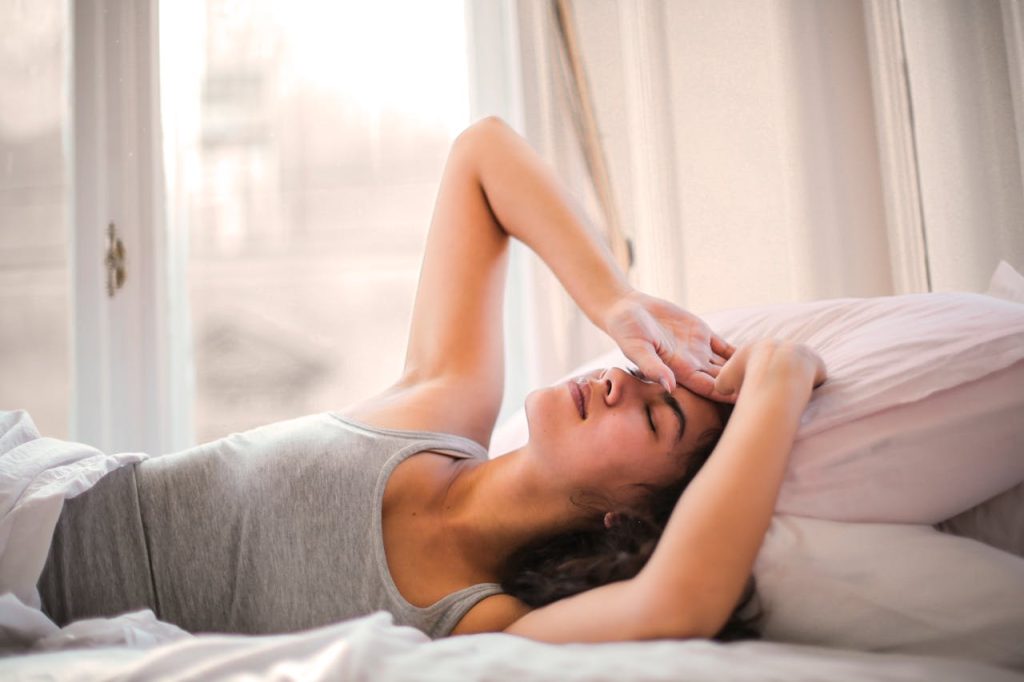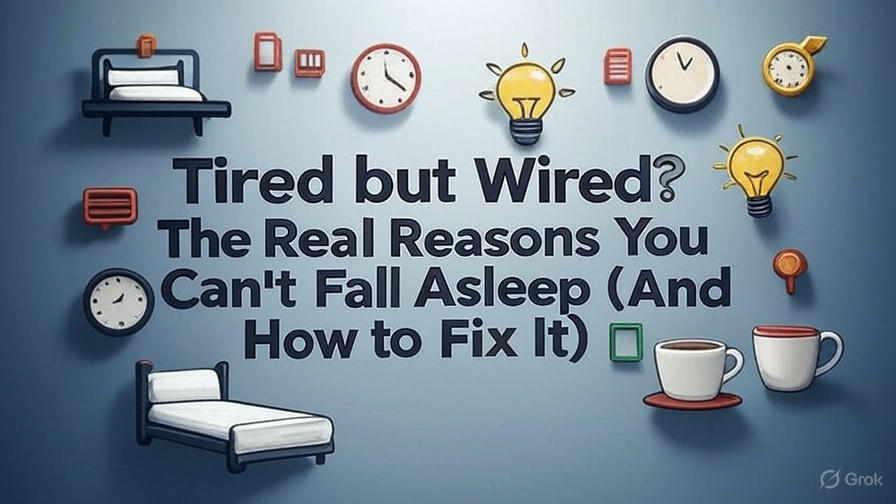It’s 3:17 AM. The house is silent, the world is asleep, but you’re wide awake. Your body feels heavy with exhaustion, a deep, bone-weary fatigue that’s been building all day. Yet, your mind is running a marathon. It’s replaying conversations, building tomorrow’s to-do list, and worrying about things you can’t control. You’re physically drained but mentally buzzing. You close your eyes, you count sheep, you try deep breathing, but sleep remains a distant, mocking stranger.
If this scene feels painfully familiar, you’re not alone. The frustrating paradox of being too tired to stay awake but too wired to fall asleep is a silent epidemic in our fast-paced, always-on world. It’s more than just an annoyance; it’s a cry for help from a body and mind that are out of sync.
So, why can’t you fall asleep even when you’re tired? The answer isn’t a single, simple culprit. It’s a complex web of psychological habits, biological signals, and environmental cues. Let’s untangle this web together, explore the science behind your sleepless nights, and uncover actionable strategies to finally reclaim your rest.
The “Tired but Wired” Brain: Psychological Roadblocks
Often, the biggest barrier to sleep isn’t in your body; it’s in your head. Your mental and emotional state is a powerful regulator of your ability to drift off.

1. The Anxiety-Insomnia Loop
Have you ever started worrying about not being able to sleep… which then, ironically, keeps you from sleeping? This is the anxiety-insomnia loop, a vicious cycle where the fear of sleeplessness becomes the very thing that fuels it. Your bed, which should be a sanctuary of rest, becomes a stage for performance anxiety. The pressure to “succeed” at sleeping triggers a stress response, making sleep impossible.
2. The Overthinking, “To-Do List” Mind
Our modern lives demand constant planning, problem-solving, and analysis. Unfortunately, our brains don’t always come with an “off” switch. Lying in the quiet dark can be the first moment of unstructured time you’ve had all day, and your brain seizes the opportunity. It becomes a whirlwind of “Did I remember to email that person?” and “What should I make for dinner tomorrow?” This cognitive hyperarousal is the mental equivalent of trying to sleep in the middle of a bustling marketplace.
3. Unresolved Stress and Cortisol
Think of cortisol as your body’s built-in alarm system. It’s the primary stress hormone that fuels your “fight or flight” response. In a healthy cycle, cortisol levels are highest in the morning to wake you up and gradually decrease throughout the day. However, chronic stress—from work, relationships, or finances—can keep your cortisol levels elevated well into the evening. Your body is physically exhausted, but the cortisol is screaming, “Danger! Stay alert!” It’s like the bouncer at a nightclub who refuses to let you in, even though you’re on the guest list.
4. Depression and Sleep Disturbance
The link between depression and sleep is a two-way street. Depression can profoundly disrupt sleep architecture, often causing early morning awakenings or difficulty falling asleep (sleep-onset insomnia). Conversely, chronic sleep deprivation is a significant risk factor for developing depression. The chemical imbalances in the brain associated with depression can throw your entire sleep-wake cycle into disarray.
Your Body’s Clock is Out of Sync: The Circadian Rhythm Conundrum
Your body has a brilliant internal timekeeper, but our modern lifestyles are constantly trying to break it. This is where biology plays a starring role in your sleeplessness.

1. What is a Circadian Rhythm, Anyway?
Imagine a master clock in your brain (specifically, in the suprachiasmatic nucleus) that coordinates all your body’s functions over a 24-hour period. This is your circadian rhythm. It dictates when you feel sleepy, when you feel alert, when you get hungry, and even your body temperature. When you can’t fall asleep even when you’re tired, it’s often a sign that this master clock is out of whack.
2. The Social Jetlag Effect
You’re diligent with your sleep schedule from Monday to Friday, but on weekends, you stay up late and sleep in. Sound familiar? This is “social jetlag.” You’re essentially putting your body through the same experience as flying across time zones every single weekend. When Sunday night rolls around, your body clock is still on “weekend time,” making it incredibly difficult to fall asleep at a reasonable hour for your Monday morning.
3. Light Exposure: Your Clock’s Biggest Influence
Light is the single most powerful signal for your internal clock. Bright sunlight in the morning tells your brain, “It’s daytime! Wake up and be alert!” Conversely, darkness tells it, “It’s nighttime. Time to wind down and produce melatonin.” The problem? We spend our days in dimly lit offices and our evenings staring at intensely bright screens (phones, tablets, TVs). This blue light exposure at night effectively tricks your brain into thinking it’s still daytime, suppressing the release of sleep-inducing hormones.
4. The Misunderstood Role of Melatonin
Melatonin is often called the “sleep hormone,” but that’s a bit of a misnomer. It’s more accurately the “hormone of darkness.” Its job isn’t to knock you out like a sleeping pill, but to signal to your entire body that it’s nighttime and sleep should be on the horizon. When your circadian rhythm is disrupted by things like erratic schedules or late-night blue light, your melatonin production can be delayed or blunted, leaving you feeling tired but not sleepy.
Daily Habits That Sabotage Your Sleep: Lifestyle Culprits
The choices you make from the moment you wake up can either set the stage for a restful night or pave the road to 3 AM frustration.

1. The Caffeine Curse (and its Long Half-Life)
That 3 PM latte might feel essential for getting through the afternoon slump, but it could be the very thing ruining your sleep at 11 PM. Caffeine has a half-life of about 5-6 hours, meaning half the dose is still in your system that long after you consume it. For some people (slow metabolizers), its effects can linger even longer. You might not feel “caffeinated,” but it can still be subtly stimulating your nervous system, preventing you from reaching deep, restorative sleep stages.
2. The Deceptive “Nightcap”
A glass of wine or a beer before bed can feel relaxing and might even help you doze off faster. But don’t be fooled. Alcohol is a major disruptor of sleep quality. As your body metabolizes the alcohol, it leads to a “rebound effect” a few hours later. This causes fragmented sleep, frequent awakenings, and prevents you from entering the crucial REM sleep stage. You fall asleep, but you don’t stay asleep or wake up feeling refreshed.
3. The Late-Night Feast
Eating a large, heavy, or spicy meal too close to bedtime can be a recipe for a restless night. Your digestive system has to work overtime, which can be uncomfortable and raise your body temperature—the opposite of what should be happening before sleep. Heartburn and indigestion are also common sleep thieves triggered by late-night eating.
4. Exercise Timing: Friend or Foe?
Regular exercise is fantastic for sleep, but timing matters. A vigorous, high-intensity workout raises your core body temperature, heart rate, and adrenaline levels. While this is great for your fitness, doing it within 1-2 hours of bedtime can leave you feeling energized and alert when you should be winding down. A gentle, restorative yoga or stretching session, however, can be beneficial.
Your Bedroom is Working Against You: Environmental Saboteurs
Your sleep environment is a powerful, often overlooked, factor. Your bedroom should be a cave: cool, dark, and quiet.

1. The Light Pollution Problem
Even the tiniest sliver of light—from a streetlamp outside, a charging indicator, or an alarm clock display—can penetrate your eyelids and signal to your brain that it’s not time for deep sleep. The goal should be absolute, pitch-black darkness.
2. The Wrong Temperature
Have you ever tried to sleep in a stuffy, hot room? It’s nearly impossible. Your body’s core temperature needs to drop slightly to initiate and maintain sleep. The ideal sleep temperature for most people is surprisingly cool, around 65°F (18.3°C). A room that’s too hot or too cold can cause restlessness and prevent you from settling into deeper sleep stages.
3. A Noisy Nightmare
From a snoring partner to traffic noise to the hum of the refrigerator, unexpected sounds can jolt you out of light sleep or prevent you from falling asleep in the first place. Your brain continues to process sounds even while you sleep, and it can interpret sudden noises as potential threats.
4. Your Bed Has an Identity Crisis
Do you work, eat, watch Netflix, and scroll through social media in bed? If so, you’ve taught your brain that your bed is a place for activity, not just rest. This weakens the powerful psychological association between getting into bed and falling asleep. Your bed should be reserved for two things only: sleep and intimacy.
When It’s More Than Just a Bad Night: Underlying Medical Conditions
Sometimes, despite your best efforts with lifestyle and environment, an underlying medical issue is the root cause of your sleeplessness.
1. Sleep Apnea
This is a condition where your breathing repeatedly stops and starts during sleep. These pauses can happen hundreds of times a night, jolting you into a lighter stage of sleep without you even realizing it. The classic signs are loud snoring, gasping for air, and significant daytime sleepiness, but you can still feel “wired” at night due to the constant adrenaline spikes from the breathing interruptions.
2. Restless Legs Syndrome (RLS)
RLS is a neurological disorder characterized by an overwhelming, often uncomfortable urge to move your legs, typically in the evening or at night when you’re sitting or lying down. This creepy-crawly or itching sensation makes it incredibly difficult to relax and fall asleep.
3. Chronic Pain and Discomfort
It’s a simple but profound truth: it’s hard to sleep when you’re in pain. Conditions like arthritis, fibromyalgia, back pain, or even acid reflux can create a level of physical discomfort that makes finding a restful position a constant, frustrating battle.
FAQs Section
1. Is it okay to take a nap if I can’t sleep at night?
It depends. A short nap (20-30 minutes) early in the afternoon can be beneficial for some. However, napping for too long or too late in the day can decrease your “sleep drive,” making it even harder to fall asleep at night. If you’re struggling with insomnia, it’s often best to avoid naps altogether to build up a strong desire for sleep by bedtime.
2. I’ve tried melatonin supplements, and they don’t work. Why?
Melatonin isn’t a sedative. It’s a timing signal. If your problem isn’t a delayed body clock, but rather anxiety or stress, melatonin won’t do much. Also, the supplement industry is poorly regulated; studies have shown that the actual dose in a pill can vary wildly from what’s on the label. It’s best used for specific issues like jet lag, under a doctor’s guidance.
3. What should I do if I wake up in the middle of the night and can’t get back to sleep?
Don’t just lie there staring at the ceiling and getting frustrated. This teaches your brain that bed is a place for fretful wakefulness. Follow the “20-Minute Rule”: if you haven’t fallen back asleep in about 20 minutes, get out of bed. Go to another dimly lit room and do something calm and boring—read a dull book, listen to soft music, or do gentle stretches. Return to bed only when you feel sleepy again.
4. How long should it take to fall asleep?
A healthy “sleep latency” (the time it takes to fall asleep) is typically between 10 and 20 minutes. Falling asleep the second your head hits the pillow might sound ideal, but it’s often a sign of significant sleep deprivation. Taking longer than 30 minutes regularly is a sign of sleep-onset insomnia.
5. Will “catching up” on sleep on weekends fix my sleep debt?
While sleeping in can help you feel better temporarily, it doesn’t fully erase the cognitive and physiological damage of a week of poor sleep. More importantly, as mentioned earlier, it creates “social jetlag,” which disrupts your circadian rhythm and makes it harder to fall asleep on Sunday night, perpetuating the cycle of sleep deprivation for the week ahead. Consistency is far more powerful than catching up.
Myths and Misconceptions
- Myth: You can learn to function perfectly on just a few hours of sleep.
Reality: A tiny fraction of the population has a genetic mutation allowing them to thrive on short sleep. For the vast majority (over 99%), chronic sleep deprivation leads to impaired cognitive function, poor emotional regulation, and increased health risks, even if you feel like you’re functioning okay. - Myth: Hitting the snooze button is a gentle way to wake up.
Reality: Hitting snooze fragments your sleep in the crucial final hour. That light, low-quality dozing between alarms can cause sleep inertia, making you feel groggy and sluggish for hours after you finally get out of bed. - Myth: A warm, cozy bedroom is best for sleep.
Reality: A cozy bed is great, but a warm room is not. Your body needs to lower its core temperature to sleep effectively. A cool room (around 65°F / 18°C) is scientifically proven to promote better, deeper sleep. - Myth: If you’re tired enough, you’ll eventually fall asleep anywhere.
Reality: This ignores the role of hyperarousal. Severe anxiety or stress can override physical exhaustion, creating the classic “tired but wired” state where sleep is physically impossible despite extreme fatigue. - Myth: Watching TV is a good way to relax before bed.
Reality: The flickering lights, stimulating content, and blue light emitted from a television can all interfere with the winding-down process and suppress melatonin production, making sleep more difficult.
Least Known Facts
- Your Brain Cleans Itself During Sleep: The glymphatic system, your brain’s unique waste-disposal system, is up to 10 times more active during sleep. It flushes out metabolic byproducts and toxins, including beta-amyloid, the protein linked to Alzheimer’s disease.
- “Second Sleep” Was Historically Normal: Before the industrial revolution and artificial lighting, it was common for people to have two distinct sleep phases. They would sleep for a few hours, wake for an hour or two in the middle of the night to read, pray, or socialize, and then go back to sleep until morning.
- Your Gut Microbiome Influences Sleep: The trillions of bacteria in your gut produce neurotransmitters like serotonin and GABA, which are crucial for regulating sleep and mood. An unhealthy gut can directly contribute to poor sleep.
- Sleep Deprivation Can Mimic ADHD Symptoms: In both children and adults, a lack of sleep can manifest as difficulty focusing, impulsivity, and emotional volatility—symptoms that are often misdiagnosed as ADHD.
- The Full Moon Might Affect Sleep (Slightly): While controversial, some controlled studies have found that around the full moon, participants took longer to fall asleep, had lower melatonin levels, and spent less time in deep sleep, even in a lab with no windows. The mechanism is still a mystery.
Real-Life Examples
- Sarah, the Ambitious Professional: Sarah works 10-hour days and prides herself on her productivity. She drinks coffee until 4 PM, answers emails in bed until 10 PM, and then wonders why she can’t shut her brain off. Her body is exhausted, but her mind is still in “work mode,” fueled by caffeine and cortisol from work stress. Her solution starts with creating a hard “digital sunset” at 9 PM and switching her afternoon coffee to herbal tea.
- Mark, the New Parent: Mark’s 6-month-old has finally started sleeping through the night, but now Mark can’t. His body is still conditioned to wake up every few hours. He lies in bed feeling anxious, listening for every tiny sound. His sleep problem is now behavioral. His fix involves getting out of bed when he’s awake for too long (the 20-minute rule) to break the association between his bed and anxious wakefulness.
- Linda, the Health-Conscious Retiree: Linda eats well and exercises, but she’s developed an uncomfortable tingling in her legs every evening. She tosses and turns, trying to relieve the sensation. She’s suffering from Restless Legs Syndrome. Her solution requires a visit to her doctor, who can check her iron levels (a common cause) and discuss treatment options.
Expert Opinions
- Dr. Matthew Walker, Neuroscientist and author of “The single most effective thing you can do to improve your sleep is to go to bed and wake up at the same time every single day, no matter what. Even on weekends. Regularity is king, and it will anchor your sleep and improve both the quantity and the quality.”
- A Cognitive Behavioral Therapy for Insomnia (CBT-I) Specialist: “Insomnia is often a problem of learned behaviors and beliefs. We don’t ‘try’ to sleep; we ‘allow’ sleep to happen. The goal of CBT-I is to break the cycle of sleep-related anxiety by restructuring negative thoughts and implementing powerful behavioral strategies, like stimulus control (only using the bed for sleep) and sleep restriction, to retrain the brain to sleep efficiently.”
- A Registered Dietitian Nutritionist: “What you eat has a profound impact on sleep. Avoid heavy, spicy, or fatty foods before bed. Focus on incorporating sleep-supportive nutrients throughout the day, like magnesium (found in leafy greens, nuts, and seeds), which helps calm the nervous system, and tryptophan (found in poultry and dairy), which is a precursor to serotonin and melatonin.”
Comparisons (X vs Y)
- Tired vs. Sleepy:
- Tired: Refers to physical or mental fatigue. It’s a lack of energy. You can be tired from a long workday or an intense workout.
- Sleepy: Refers to the biological drive to sleep. It’s the physiological state of needing to transition to sleep, often accompanied by yawning and heavy eyelids. The core problem is when you are tired but not sleepy.
- Sleep Onset Insomnia vs. Sleep Maintenance Insomnia:
- Sleep Onset Insomnia: The primary difficulty is falling asleep at the beginning of the night. This is often linked to anxiety, circadian rhythm issues, or environmental factors.
- Sleep Maintenance Insomnia: The primary difficulty is staying asleep. People with this condition wake up frequently during the night or too early in the morning and can’t get back to sleep. This is often linked to medical conditions, alcohol use, or depression.
- Melatonin Supplements vs. Natural Melatonin Production:
- Melatonin Supplements: An external dose of the hormone, best used to shift a delayed body clock (like with jet lag). It’s a “chronobiotic,” not a hypnotic (sleeping pill).
- Natural Melatonin Production: The body’s own release of the hormone in response to darkness. The goal of good sleep hygiene is to support and maximize this natural process by controlling light exposure and maintaining a consistent schedule.
Mistakes to Avoid
- Mistake: Staying in Bed and Tossing and Turning for Hours.
Why it’s a mistake: This trains your brain to associate your bed with frustration, anxiety, and wakefulness. It strengthens the insomnia cycle.
What to do instead: Get out of bed after about 20 minutes. Do a quiet, calming activity in another room and only return to bed when you feel sleepy. - Mistake: Using Your Phone in Bed to “Wind Down.”
Why it’s a mistake: The blue light from the screen directly suppresses melatonin. Furthermore, the content—whether it’s social media, news, or games—is cognitively stimulating, putting your brain into an active, engaged state.
What to do instead: Establish a tech-free buffer zone of at least 60-90 minutes before your intended bedtime. Read a physical book, listen to a podcast, or talk with a partner instead. - Mistake: Compensating for a Bad Night with Lots of Caffeine the Next Day.
Why it’s a mistake: While it provides a temporary boost, over-caffeinating can mask your body’s true sleep signals and disrupt your sleep the following night, creating a self-perpetuating cycle of poor sleep and caffeine dependency.
What to do instead: If you need caffeine, have it early in the day. Try to get some morning sunlight and do some light physical activity to boost alertness naturally.
Conclusion: Take Back Your Night, One Step at a Time
The answer to the question, “Why can’t I fall asleep even when I’m tired?” is rarely simple. It’s a tapestry woven from your thoughts, your hormones, your habits, and your environment.
But here’s the good news: you hold the threads. You don’t have to overhaul your entire life overnight. The path to better sleep isn’t about perfection; it’s about intention.
Start small. Pick just one or two strategies from this guide to focus on this week. Maybe it’s establishing a “digital sunset” one hour before bed. Perhaps it’s making your bedroom a few degrees cooler. Or maybe it’s simply committing to a consistent wake-up time, even on Saturday.
Listen to what your tired-but-wired body is trying to tell you. It’s asking for consistency, for darkness, for quiet, and for calm. By understanding the ‘why’ behind your sleeplessness, you empower yourself to implement the ‘how’ of getting better rest. And if these strategies don’t seem to move the needle, don’t hesitate to speak with a doctor or a sleep specialist. Reclaiming your sleep is one of the most powerful things you can do for your health and happiness.
Tonight, don’t just hope for sleep. Create the conditions for it to find you. You deserve the rest.

